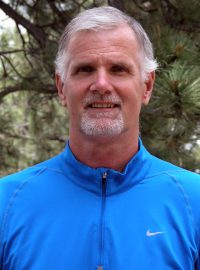JONTY SKINNER
Coach Skinner’s background covers all aspects of human performance, and his experience and a coach and a science based human performance director have made him the coach he is today. He started as a small town club coach and expanded from there to encompass roles as:
- Head coach of San Jose Aquatics when they won junior and senior national team titles Head swimming coach at the of University of Alabama from 1991 to 1994
USA Swimming Resident Team coach 1994 to 2000 - Chairman of USA Swimming’s Sport Medicine Committee from 1989 to 1994
- Director of Technical support for USA Swimming. 2000 to 2008. This involved overseeing all aspects of human performance for the USA National Team
- World Class Performance Advisor for British Swimming 2009 to 2012
- CEO and owner of Athletic Intelligence Brain Training Incorporated 2007 to now
- Current member of the International Swimming Hall of Fame; American Swim Coaches Hall of Fame.
Coach Skinner is one of the world’s leading experts in how science impacts human performance. He is a self-taught science based coach who uses a combination of cutting edge technology, his understanding of how neuroscience impacts racing skills and his in depth understanding of all aspects of technique and skills to develop his athletes into Gold Medalists. What makes him unique as a coach is his understanding of how neuroscience impacts the sport and his experience at bringing this facet of adaptation to his swimmers makes him the only coach in the world of swimming who understands how that paradigm is the new frontier in performance. He has produced Champions at all levels of swimming, and during his non coaching years spent 12 years of his career as either a director of human performance or a consultant to coaches around the world with regards to human performance.
After years of study into the how the brain impacts performance, he established Athletic Intelligence Brain Training in 2008 to bring that aspect to the forefront in swimming. In his words, “the brain controls everything we do. We’re like a racing super computer with hardware and software and like all computers our brain is able to produce performances based off our hardware and programming (training). If you understand how the physical brain manages performance, then you’ll be able to upgrade the software in a way that produces higher levels of peak performance.” “I’ll also add that it’s not really as simple as rewiring the brain since the brain is extremely reluctant to change what it knows, so improving skills at the elite level requires tricking the brain into exploring new avenues and then bringing those concepts back into the full stroke.”
In his swimming career Skinner arrived in Alabama in the fall of 1974 as a sprinter on one of legendary Tide coach Don Gambril’s first teams. He made an immediate impact, winning Alabama’s first NCAA championship as a freshman in 1975 when he touched the wall first in the 100 freestyle. Skinner went on to shatter the world record in the 100-meter freestyle during the summer of 1976, setting a standard that would endure until 1981. After graduation, the 19-time All-American started his coaching career under Gambril as an Alabama assistant. From there he went on to a highly successful stint as head coach of the San Jose Aquatics Club, where his teams won a USA Senior National team championship and five USA Junior National team titles. After returning to Tuscaloosa in the late 1980s as associate head coach, Skinner took over the head coaching reins in 1990 when Gambril retired. Skinner capped his four-year tenure as the Tide’s head coach by leading both the men and women to top-10 national finishes in 1994, the same year he was named the SEC Women’s Coach of the Year.
In the summer of 1994, Pursley, then the director of the USA National Team, chose Skinner as the inaugural coach of United States Swimming’s Resident National Team at the Olympic Training Center in Colorado Springs, Colo. From there Skinner went on to coach some of the world’s top swimmers at the elite national and international level. Skinner-coached swimmers have won 18 national titles and 20 Olympic medals – including 17 gold. He has also produced two Kipputh Award winners. Alabama standout Jon Olsen stands tall among Skinner’s former pupils. Following an All-America career at the Capstone, Olsen won five Olympic medals – including four that were gold – under Skinner’s tutelage. Olsen still holds the Alabama 100 and 200 freestyle school records.
During his own swimming career, Skinner captured four national titles to go with his NCAA title and five years as the world record holder in the 100m freestyle. In 1986 he was inducted into the International Swimming Hall of Fame.After six years as the head coach of the USA Resident National Team, Skinner spent the next eight years as USA Swimming’s Director of Performance Science and Technology, coordinating all of the testing, tracking and assessment of U.S. National Team members. From 2009-12, he worked in a similar capacity with British Swimming.
In addition to his work with the USA and British national teams, Skinner founded Athletic Intelligence Consulting to further his work and research in neuroscience and how it relates to elite level training and competition.“Jonty is a proven leader in cutting-edge science and technology as it applies to competitive swimming,” Pursley said. “His experience in working with many of the world’s top swimmers and coaches provides a wealth of knowledge to our program. He is a great motivator and proven winner who is passionately committed to helping his swimmers become the best that they can be.”
